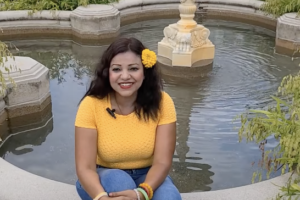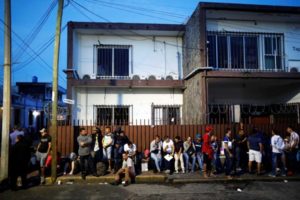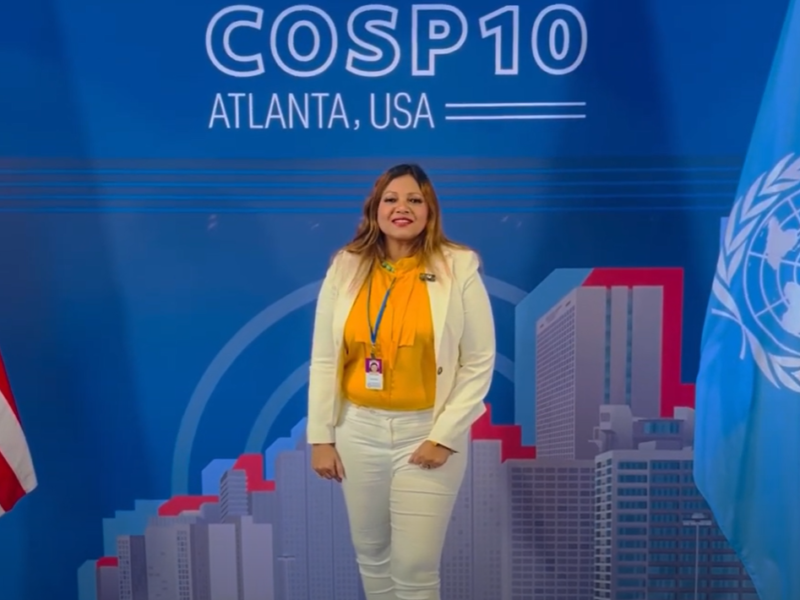Angela Foster started showing up in the early days of the protests in Portland as one of the novice activists standing off to the side with no gear to protect herself.
Roughly 40 demonstrations later, she has moved toward the front, wearing a mask, goggles and a helmet, and bracing for law enforcement officers to charge.
“We’re not leaving,” Foster said in interview on Sunday.
While President Donald Trump on Sunday described the unrest in Portland as a national threat involving “anarchists and agitators,” the protests have featured a wide array of demonstrators, many now galvanised by federal officers exemplifying the militarised enforcement that protesters have long denounced. Gatherings over the weekend grew to upward of 1,000 people, some of the largest crowds in weeks.
Some protesters have exhibited the lawless behaviour that federal officials have cited to justify their crackdown: They have thrown cans and bottles, shot fireworks or pointed lasers at officers. One was recently accused of hitting a federal officer with a hammer. On Saturday, protesters set a fire in the police union headquarters.
But many others have demonstrated in the streets through peaceful means, appalled by the aggressive responses by federal officers that have left some protesters injured and the air inflamed with tear gas. They have held signs and marched. At times when people have thrown bottles, other demonstrators have rushed to try to stop them. On Saturday, a group of women locked arms and chanted: “Feds stay clear. Moms are here.”
Federal law enforcement agents disperse crowds in Portland, Ore, July 18, 2020. The New York TimesFederal law enforcement agents disperse crowds in Portland, Ore, July 18, 2020. The New York TimesAttending the protests for the first time over the weekend was Christopher David, 53, a former Navy civil engineering corps officer and a 1988 graduate of the US Naval Academy.
“I wasn’t even paying attention to the protests at all until the feds came in,” David said. “When that video came out of those two unmarked guys in camouflage abducting people and putting them in minivans, that’s when I became aware.”
He had taken a bus to the Portland courthouse and was about to leave around 10:45 pm when federal officers emerged and began advancing on the protesters. He said he felt the need to ask the officers: Why were they violating their oath to the Constitution?
Instead of getting an answer on Saturday, David, a 6-foot-2, 280-pound former Navy varsity wrestler, found himself being beaten with a baton by a federal officer dressed in camouflage fatigues as another doused him with pepper spray, according to video of the encounter.
David was taken to a nearby hospital, where a specialist said his right hand was broken and would require surgery to install pins, screws and plates.
“I’m appalled and disappointed at the feds’ behaviour — that whoever led them and trained them allowed them to become this way,” David said. “This is a failure of leadership more than it is a failure of their own individual behaviour towards me.”
Luis Enrique Marquez, a self-described anti-fascist who has been a fixture at protests in Portland for years, said the purpose of the federal officers’ arrival had appeared to be to scare the protesters. But he said the officers had instead galvanised them by displaying the types of actions that have concerned protesters for years.
“With every act of violence they commit, our numbers seem to grow, people seem to get more angry,” Marquez said.
Demonstrators in Portland, including some who identify as antifa, the loose coalition of self-described anti-fascist activists, have had years of conflict with law enforcement. But after the killing of George Floyd in Minneapolis set off a nationwide movement for racial justice and police accountability, the protest in Portland drew thousands to the streets.
That created powerful scenes including one of protesters blanketing the Burnside Bridge, each lying face down on the pavement for eight minutes and 46 seconds in remembrance of Floyd.
While those initial mass crowds have waned, hundreds of protesters have continued on with near-nightly confrontations with law enforcement.
Unlike demonstrators in Seattle at the Capitol Hill Organised Protest, or CHOP, in which they established a permanent location that created tensions over how the police should handle unrest inside the area, protesters in Portland have brought the same feel of communal support throughout the downtown area. Volunteers wearing red crosses hand out ear plugs, eye wash and hand sanitiser. A mobile snack van provides Gatorade and food.
Jeremy Vajko, who operates the snack van, said he initially operated in the CHOP zone in Seattle and then came to Portland to support the people on the streets.
“I noticed there was problems with nutrition,” he said. “People are sleep deprived.”
During the daytime, the protests can draw families, businesspeople and political leaders such as Jo Ann Hardesty, a city commissioner. At night, the crowd is made up mostly of young people. Dozens of protesters at the front carry homemade shields made out of materials such as 55-gallon drums. Others stand farther back, shining lasers or gathering materials for building barricades.
But protesters’ tactics have strained the city. Business owners, already struggling because of the coronavirus pandemic, have cited the protests as a reason residents have been staying away from downtown.
Susan Landa, who for almost 31 years has owned a business selling gems and minerals downtown, said she supported peaceful protests and even defunding and shifting funds from the police.
But she said many of the protesters seemed like “vandals” and restless young people who were “taking out rage because of the pandemic.”
She added: “Most of downtown is boarded up. We don’t feel safe enough to open up. It’s killing our businesses.”
Some leaders in the Black community have also questioned the tactics, suggesting that some demonstrators have seized the moment in the aftermath of Floyd’s killing to advance their own causes.
Last month, officers from the Portland Police Bureau repeatedly fired tear gas and made arrests of protesters, who have variously called for the abolishment or defunding of the bureau, and for more accountability for law enforcement officers. The city’s officers now operate with new limits on the use of tear gas after a judge ordered it to only be used if it is needed to keep people safe.
Protesters have focused much of their attention on Mayor Ted Wheeler, who also serves as police commissioner. Crowds have at times gathered late at night outside Wheeler’s condo building, shining lights and chanting about the perceived failures of his administration.
For weeks, Wheeler has called for an end to destructive demonstrations, saying he is concerned about “groups who continue to perpetrate violence and vandalism on our streets.” But as federal agencies have moved in to play a role in combating the unrest, Wheeler has said he told the federal officials to stay away.
City police leaders have said they are not coordinating with federal agencies on the protests. But at one point early Saturday morning, a line of federal officers was moving up one street while a line of local police officers was moving up another, both advancing to keep protesters on the move. It was unclear what level of coordination was involved in that effort.
Trump said in a Twitter post on Sunday that federal officials were “trying to help Portland, not hurt it.” Trump, who has said states need to “dominate” protesters, said Portland officials had lost control.
“They are missing in action,” Trump wrote. “We must protect Federal property, AND OUR PEOPLE.”
Local leaders have grown increasingly vocal in opposition to the federal presence after one protester appeared to have been shot in the head with what was described as a less-lethal munition, severely injuring him in a bloody scene that was captured on video. Federal officers have operated from unmarked vans, at times seizing protesters and pulling them into the vehicles.
Joel B Barker, who runs a marketing agency, said that he had frequently participated in protests during the day , and that he usually left before 9 pm at the latest. He said that the protests drew a diverse crowd, reflecting a range of racial backgrounds, age and socioeconomic statuses, and that there was a sense of unity.
Barker said he felt rage that the city was being used for what he believed was a ploy for the president in an election year.
“It’s really terrible,” he added, “and I want America to understand how terrible it is to feel like a city you love is being occupied by your own federal government, because that’s how it feels.”
Oregon’s attorney general, Ellen Rosenblum, has filed a lawsuit seeking to halt some of the detainment tactics used by federal officers.
Lisa Reynolds, a paediatrician who is running as a Democrat for a seat in the Oregon House of Representatives, said she had tried to keep her distance from the protests, largely because of the coronavirus crisis. But on Sunday, she said, she was going to be fitted for a respirator so she would be safer at protests where tear gas is used.
“I think my fear kept me away,” she said. “I think this is a step where I need to put myself out there a little more.”






















